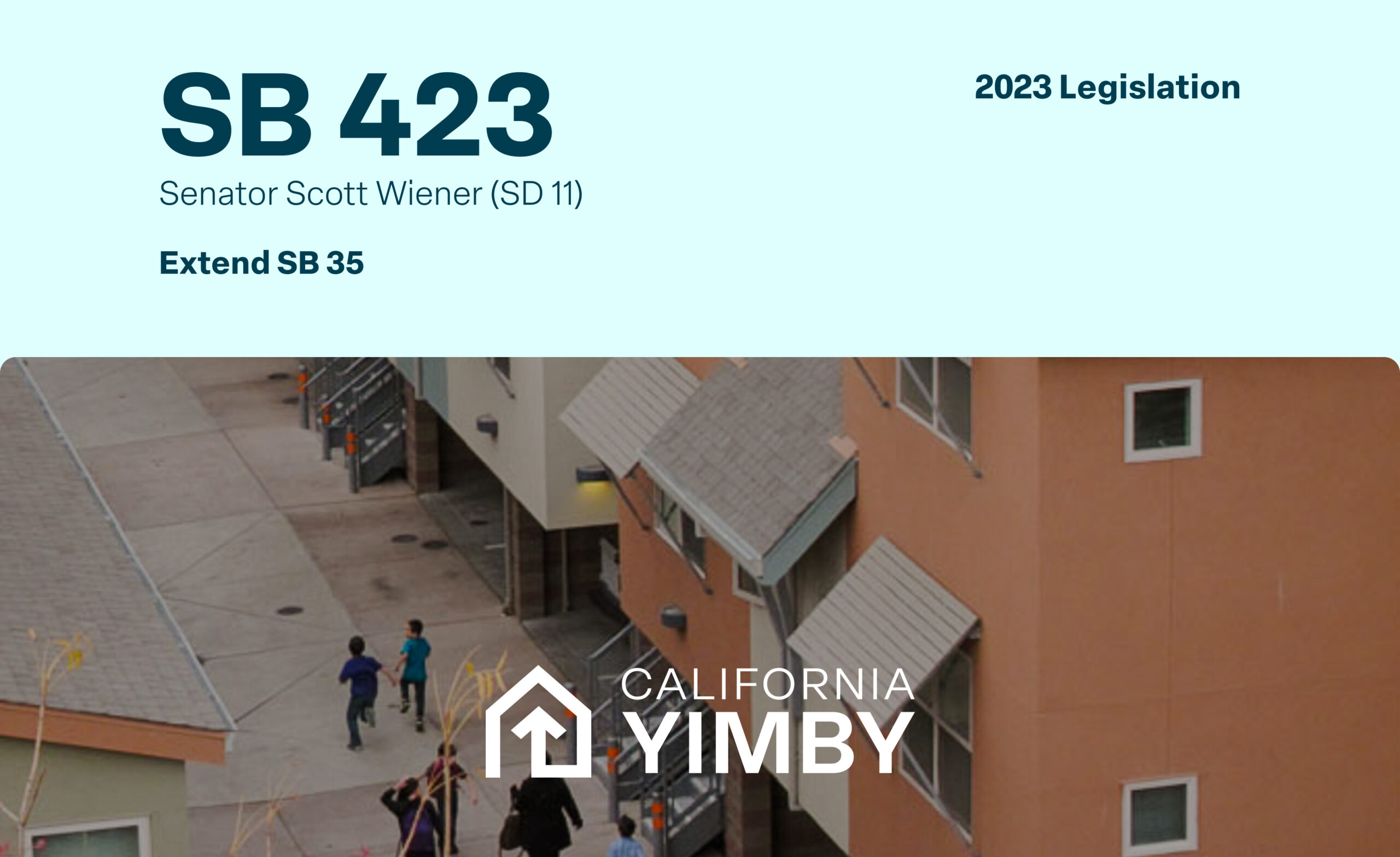SB 423 — Extend SB 35

SB 423 extends the provisions of SB 35, and expands them to encourage mixed-income housing developments. SB 35, which is scheduled to sunset in 2026, was signed into law in 2017 and has produced thousands of new subsidized affordable homes across California. SB 423 extends SB 35 to 2036, which will ensure the law continues to reduce housing costs by helping to accelerate construction of new, affordable and mixed-income homes in the places they’re most needed.
Since its passage in 2017, SB 35 has become an engine of subsidized affordable housing production in California’s cities. SB 423 will ensure that these homes continue to be built by extending the provisions of SB 35 to 2036, and expanding them to encourage mixed-income housing developments; under current law, SB 35 “sunsets” in 2026.
SB 35’s key provision is its linkage to the Regional Housing Needs Assessment (RHNA – pronounced “REE-na”) that California metropolitan areas must update every eight years. Through the RHNA process, state regulators and regional elected officials determine the proper mix of market rate and subsidized affordable housing that a region will need to both ensure broad housing affordability for existing residents, and accommodate future growth.
At the end of the RHNA process, California’s cities are assigned housing production goals that include allocations for both subsidized affordable and market-rate housing. Cities are expected to meet these goals during the next 8-year RHNA “cycle.”
While the RHNA targets are supposed to be binding – cities must permit the number of homes they are allocated during each cycle – cities also have broad discretion to approve or deny individual housing projects. In spite of state law discouraging them from doing so, cities nevertheless often block new homes outright, or put up insurmountable barriers to their development.
In these cases, cities often find themselves falling short on their RHNA targets, which leads to housing shortages, displacement and eviction crises, and increasingly unaffordable housing.
SB 35 offers a partial “fix” for this problem by allowing homebuilders to pursue a streamlined approval process in cities that have fallen behind their RHNA-allocated housing production targets.
Under SB 423, all of the provisions of SB 35 will be extended to 2036, and will also be expanded to more completely cover mixed-income housing developments. If passed and signed into law, SB 423 will require that cities approve a housing development application if the project fulfills the following criteria:
- The project is located on an urban infill site – meaning it is in an urban area, and 75% of the lot borders other developed parcels of land;
- The site is zoned for residential or mixed uses in the jurisdiction’s general plan, and is consistent with objective design standards;
- Developers pay prevailing wage on all projects with more than 10 units;
- For projects with 50 units or more, the developer must provide healthcare benefits
- For projects over 85 feet, the developer must prioritize hiring a skilled and trained workforce
- When available, developers must hire workers participating in an apprentice program
- The site is not located in farmland, wetlands, a very-high fire risk zone, a hazardous waste site, floodplains and floodways, a habitat for protected species, or land under a conservation plan or easement; and
- The project follows all other applicable objective laws and ordinances, such as zoning rules and environmental safety rules.
The amount of affordable housing that must be included in an SB 35 project is determined by the status of the jurisdiction’s compliance with its RHNA-allocated targets. If a city is “short” on housing in any income category, then SB 35 offers a streamlined approval process for housing projects that seek to fill the gap in housing for that income category.
Updates: SB 423 passed the State Senate on 5/31/23 with a 29-5 vote. It passed the Assembly on 9/7/23 with a 52-8 vote. It passed the State Senate in a concurrence vote on 9/11/23. SB 423 was signed into law by Governor Newsom on 10/11/23.
Author: Wiener (D, SD 11)
Co-authors: Wicks (D, AD 14), Grayson (D, AD 15)
Co-sponsors: California YIMBY, California Housing Consortium, California Conference of Carpenters, LISC, Inner City Law Center
Resources:
Media: